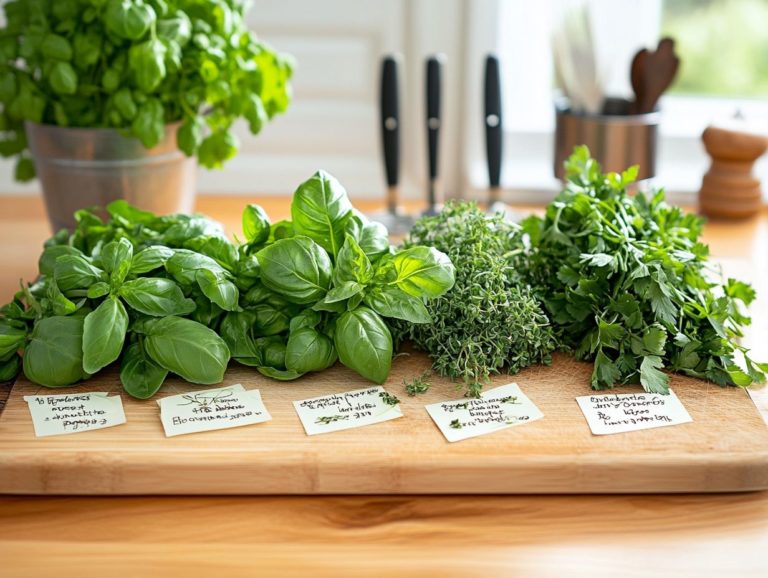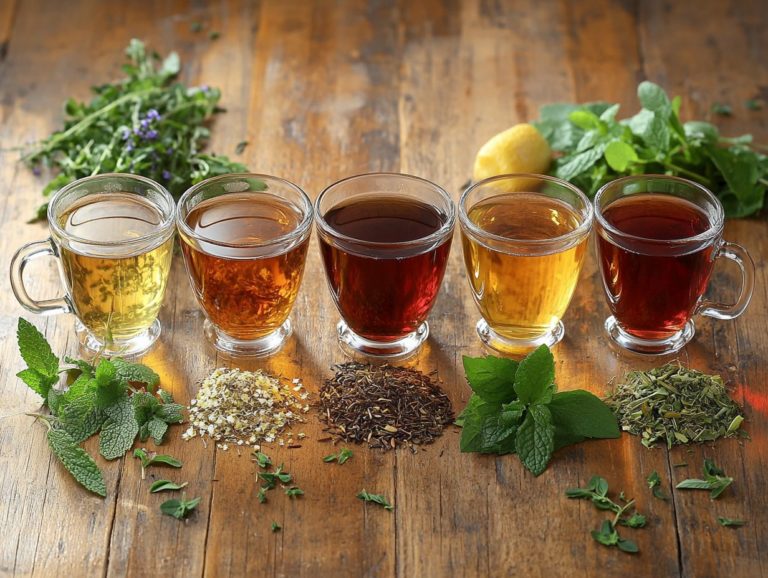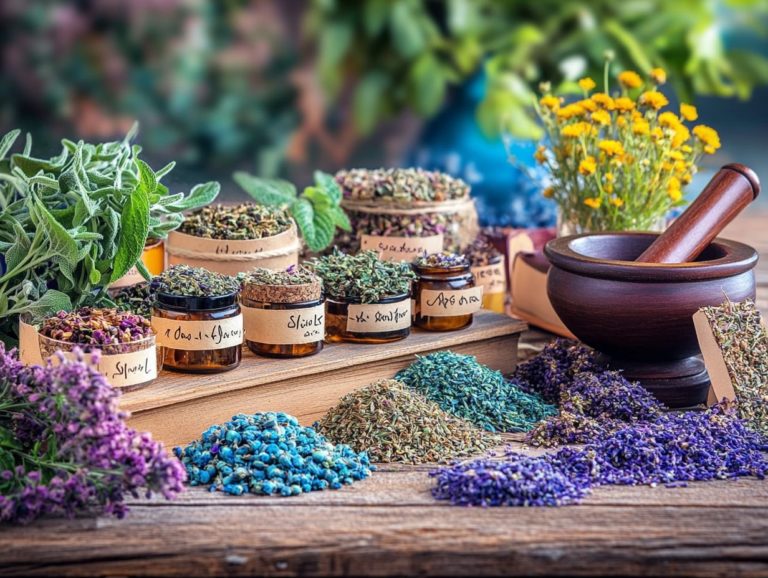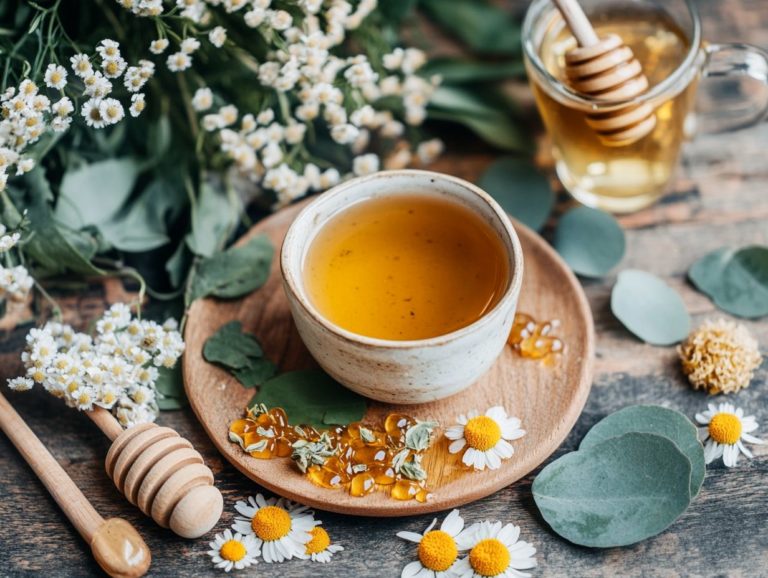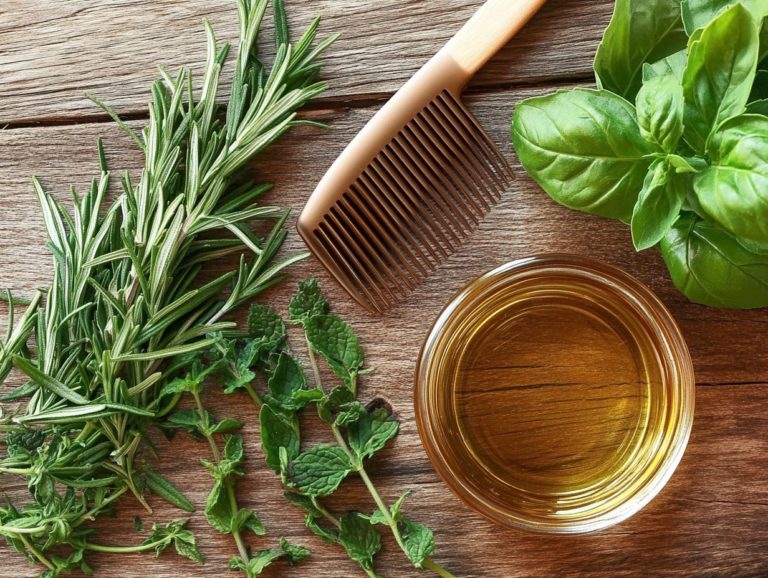Discovering the Power of Herbal Oils
Herbal oils have become quite the sensation, celebrated for their soothing properties and a wealth of health benefits. These natural extracts, derived from an array of plants, have a rich history in traditional medicine, often revered for their therapeutic effects.
In this exploration, you will discover the exciting world of herbal oils and how they can transform your health! You’ll also learn practical application methods, essential safety considerations to keep in mind, and even how to craft your own herbal oils at home.
Prepare to dive in and unlock the healing potential that nature has to offer!
Contents
Key Takeaways:
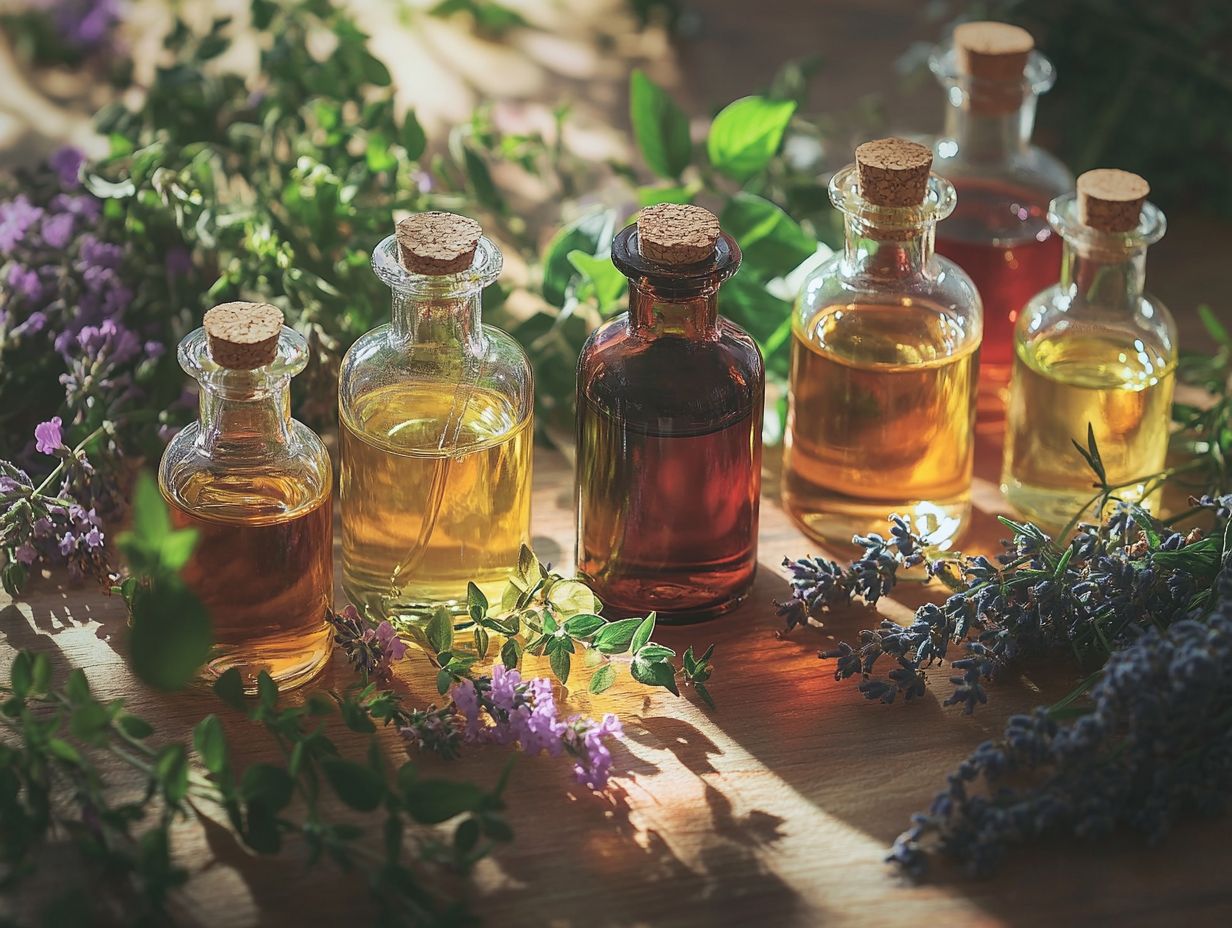
Discover the natural healing and therapeutic properties of herbal oils for overall well-being and improved health. Explore the different types of herbal oils and learn about commonly used herbs and their specific benefits.
Learn how to safely use herbal oils through proper application methods and precautions, and even try making your own DIY recipes for a personalized experience.
What are Herbal Oils?
Herbal oils are concentrated extracts derived from various plants. They elegantly capture the aromatic substances and beneficial properties of the herbs from which they originate.
You ll find these oils commonly produced through steam distillation, a method of extracting oil from plants by using steam. This process preserves the essential qualities and medicinal attributes of the plant material.
Among the many types, thyme essential oil stands out with its rich history and diverse applications, spanning aromatherapy, culinary use, and natural remedies. This meticulous extraction method enhances the therapeutic nature of the oils while ensuring that their enchanting fragrances remain intact.
Herbal oils, including thyme essential oil, are celebrated for their many health benefits, from antimicrobial properties to promoting relaxation and mental clarity. They serve as a bridge between nature and well-being, providing potent solutions for both physical ailments and emotional balance.
Thyme essential oil has garnered acclaim for its role in enhancing respiratory health and bolstering the immune system. This oil is a prized addition to both home remedy cabinets and luxurious spa treatments.
Benefits of Using Herbal Oils
The benefits of using herbal oils are numerous, offering natural remedies for a range of health concerns while improving your overall wellness.
Take thyme essential oil, for example; it s renowned for its specific therapeutic effects. This remarkable oil can help alleviate anxiety, strengthen your immune system, and support respiratory health, making it an essential component of a holistic health regimen.
Its aromatic qualities also elevate its appeal, whether you’re incorporating it into your cooking or enjoying its soothing properties in aromatherapy practices.
Natural Healing and Therapeutic Properties
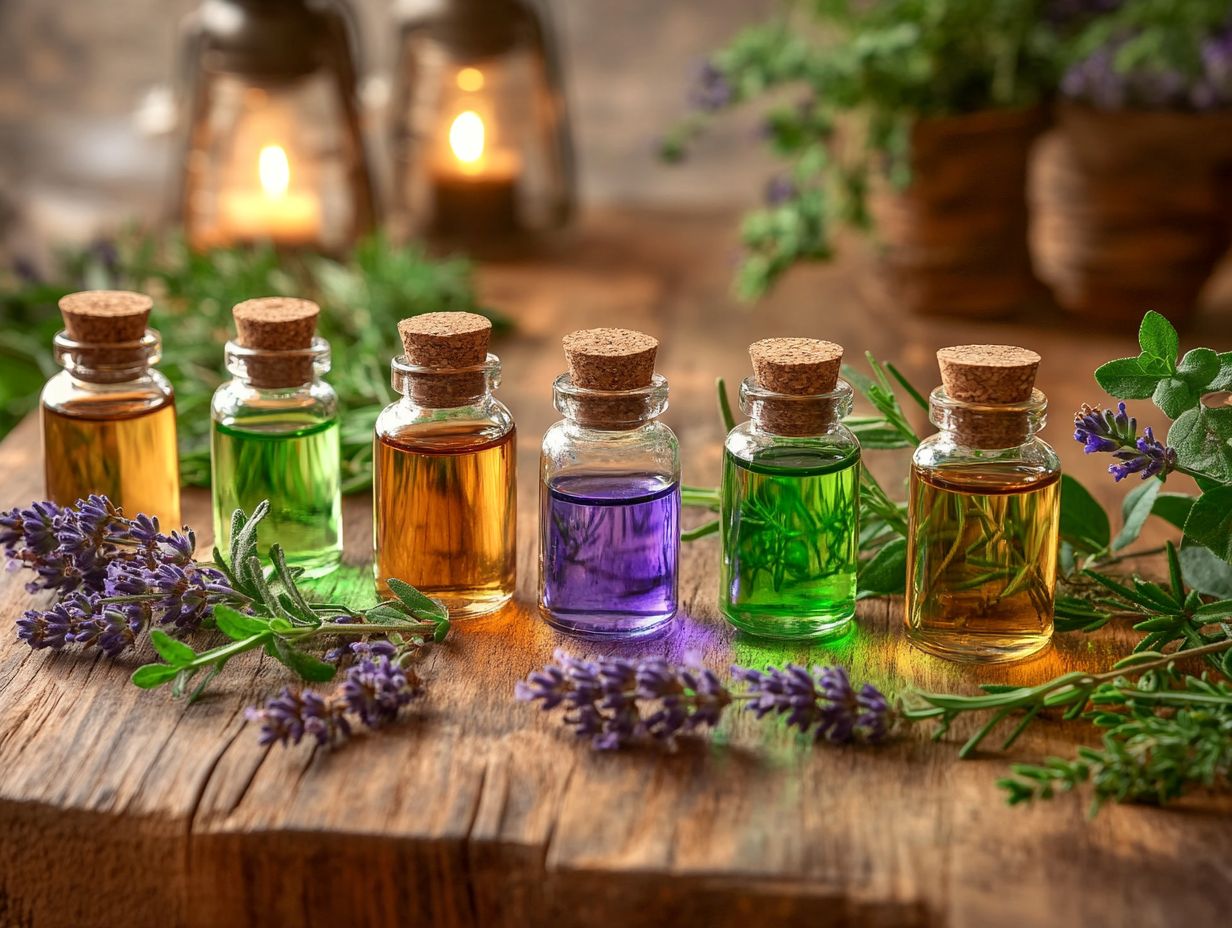
The natural healing and therapeutic properties of herbal oils come from their active compounds, offering effective remedies for various ailments, just like thyme and its essential oil. Thyme is celebrated for its medicinal prowess, particularly its anti-inflammatory benefits, which can be invaluable in addressing a range of health issues.
By integrating thyme essential oil into your daily routine, you can significantly improve your health and wellness practices.
The versatility of thyme essential oil allows it to tackle conditions such as respiratory infections. Its antiseptic qualities help clear mucus and ease coughs. Its anti-inflammatory properties can also soothe joint pain and muscle soreness, making it an excellent choice for anyone dealing with arthritis or sports injuries.
Thyme essential oil also supports the immune system, potentially shortening the duration of colds and flu. By harnessing these natural healing attributes, you can find relief without the unwelcome side effects often tied to pharmaceutical drugs.
Start your journey to natural wellness today!
Types of Herbal Oils
You ll discover a diverse array of herbal oils, each with unique benefits tailored to enhance your well-being.
Take thyme essential oil, for instance. It s renowned for its impressive health advantages. Lavender is celebrated for its calming effects, perfect for unwinding after a long day.
Ylang ylang can elevate your mood, while frankincense is cherished for its soothing qualities. Bergamot is often your go-to for stress reduction.
By familiarizing yourself with these essential oils, you can select the ones that best align with your personal needs.
Commonly Used Herbs and Their Benefits
Commonly used herbs like thyme, lavender, and ylang ylang each bring a wealth of health benefits and applications, enriching your life through culinary and therapeutic uses.
Cooking with thyme not only boosts flavor but also offers beneficial properties, making it essential in your kitchen. Lavender, with its soothing aroma, is a staple in aromatherapy. Ylang ylang is renowned for its uplifting effects on mood.
In Mediterranean cuisines, thyme adds an earthy depth to dishes, pairing exquisitely with meats, vegetables, and soups.
Beyond its culinary allure, thyme boasts antiseptic and anti-inflammatory qualities, making it a valuable ally in natural remedies.
Lavender enhances sleep quality and diminishes anxiety levels, making it a favored choice in essential oil blends.
Ylang ylang s exotic scent delights the senses and helps alleviate stress, promoting emotional balance and contributing to your overall well-being.
Incorporating these herbs into your daily routine will create delicious meals that excite your taste buds and improve your health.
How to Use Herbal Oils
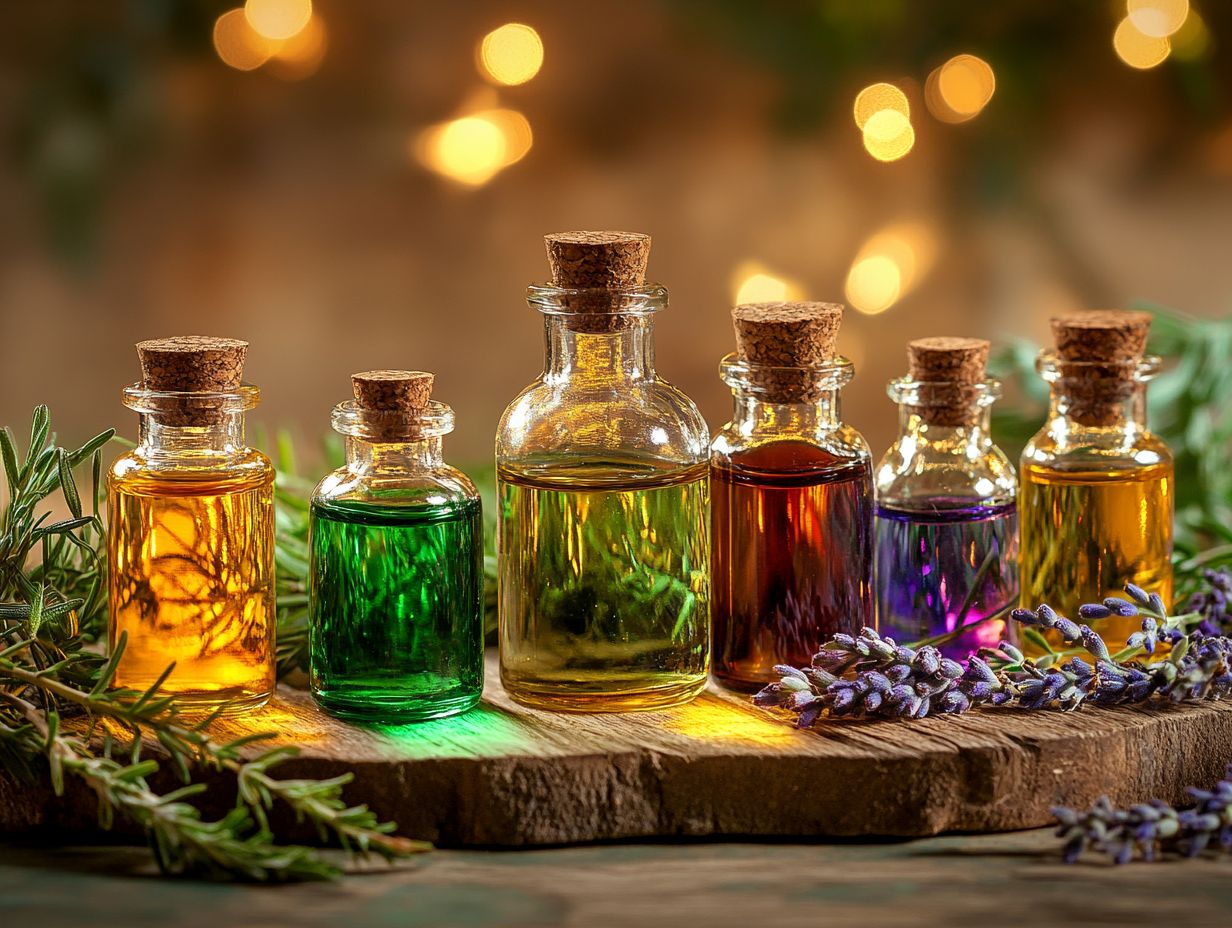
To fully benefit from herbal oils, learn the best ways to use them. For instance, consider integrating thyme essential oil into your aromatherapy practices and culinary creations. These oils can be:
- Diffused for a soothing aromatic experience
- Blended into homemade soap for luxurious skin care
- Infused into your cooking, enhancing flavor and providing health benefits
Mastering the art of application can profoundly enrich your wellness routine.
Application Methods and Tips
Knowing how to use herbal oils boosts their effectiveness. Thyme essential oil is a versatile choice.
One popular approach is diffusion, where aromatic compounds are released into the air, promoting relaxation and alleviating anxiety. When using thyme essential oil topically, dilute it to provide a natural remedy for skin reactions and inflammation.
Selecting the right diffuser is crucial for ensuring even distribution of the oil’s benefits throughout your space. For skin applications, a safe dilution ratio is one to two drops of thyme essential oil per carrier oil, which helps prevent irritation.
Thyme essential oil can elevate your culinary creations; just a single drop can enhance the depth of flavors in soups or marinades.
Always prioritize high-quality oils and consult guidelines to maximize their potential safely.
Safety Considerations
Safety is key when using herbal oils like thyme essential oil. Follow precautions to avoid skin reactions. Conduct patch tests before applying oils topically and dilute them appropriately to prevent irritation.
By understanding and adhering to these safety measures, you ensure effective usage and unlock the full therapeutic potential of herbal oils.
Possible Side Effects and Precautions
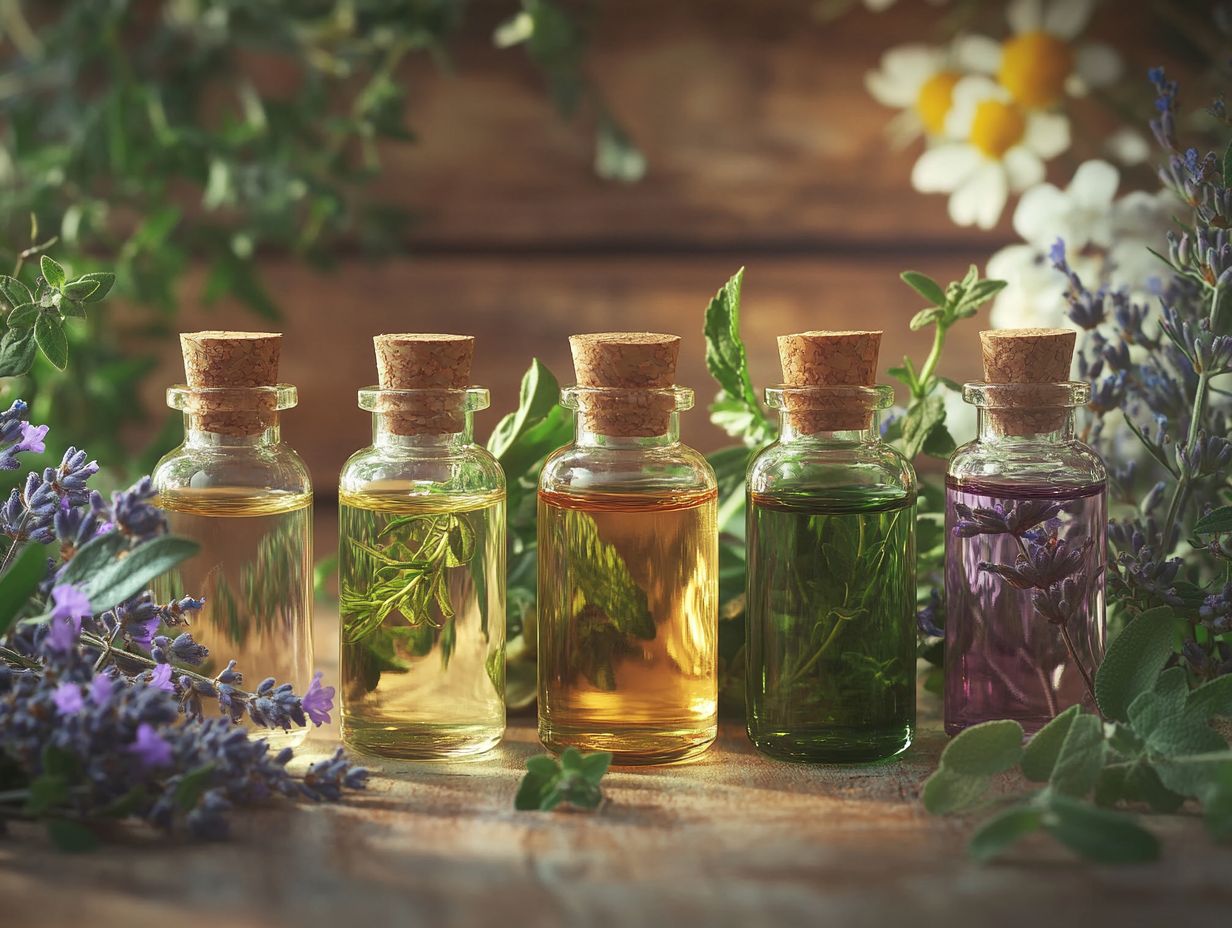
Possible side effects of herbal oils, like thyme essential oil, require your careful attention. While many enjoy these oils’ benefits, some may experience sensitivity or allergic reactions.
Thyme essential oil is known for its antimicrobial and anti-inflammatory properties. However, it can cause irritations for some individuals, with reactions ranging from mild rashes to serious dermatitis.
Before using thyme oil, do a patch test to check your tolerance. If you’re pregnant or have health issues, consult a healthcare professional first.
Prioritizing safety ensures a positive experience with essential oils.
Making Your Own Herbal Oils
Creating herbal oils is a rewarding process. You can harness the benefits of herbs like thyme leaves through simple DIY recipes.
Methods like steam distillation or cold pressing extract plant essences. These techniques keep the beneficial properties of herbs intact.
DIY Recipes and Techniques
DIY recipes let you customize herbal oils for specific benefits. For instance, you can use thyme leaves to create tailored extracts.
Steam distillation preserves the medicinal properties of herbs beautifully. Alternatively, infusion methods enhance homemade soaps.
To craft thyme-infused oil, steep dried thyme leaves in a base oil like olive or almond. This exciting process boosts the oil s fragrance and health benefits.
Once perfected, you can add your herbal oils to soaps or massage blends for a natural wellness boost.
Frequently Asked Questions
What are herbal oils?
Herbal oils are extracted from plants and flowers using infusion or distillation methods.
How can herbal oils benefit my health and wellness?
Herbal oils offer therapeutic properties for relaxation, pain relief, and skin health.
Are there any side effects of using herbal oils?
While generally safe, some may have allergies or sensitivities. Always do a patch test first.
Can I use herbal oils for cooking?
Some, like olive oil, are safe for cooking. Ensure they are food-grade first.
How do I use herbal oils?
They can be applied topically, used in aromatherapy, or ingested in small amounts. Follow usage instructions.
Where can I find high-quality herbal oils?
They are available at health food stores, specialty shops, or online. Choose reputable brands using pure, organic ingredients.

